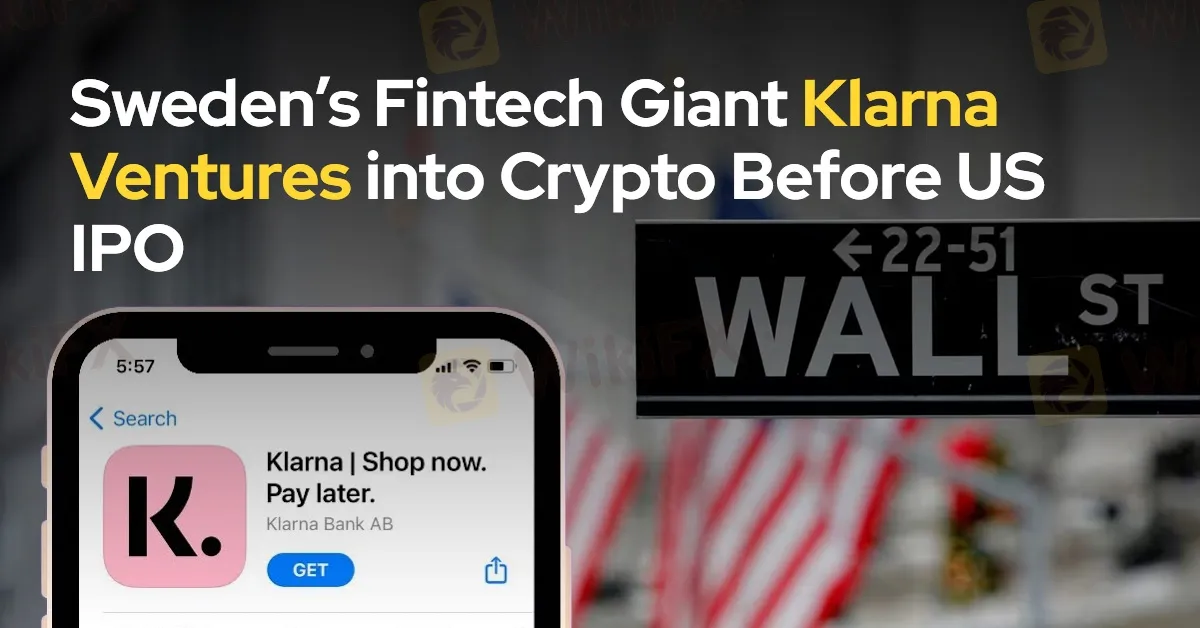简体中文
繁體中文
English
Pусский
日本語
ภาษาไทย
Tiếng Việt
Bahasa Indonesia
Español
हिन्दी
Filippiiniläinen
Français
Deutsch
Português
Türkçe
한국어
العربية
Sweden’s Fintech Giant Klarna Ventures into Crypto Before US IPO
Abstract:Swedish fintech leader Klarna has officially entered the cryptocurrency market, a move largely driven by demand from its extensive user base. The decision comes as the company prepares for its highly anticipated initial public offering (IPO) in the United States, scheduled for April, with an estimated valuation of up to $15 billion.

Swedish fintech leader Klarna has officially entered the cryptocurrency market, a move largely driven by demand from its extensive user base. The decision comes as the company prepares for its highly anticipated initial public offering (IPO) in the United States, scheduled for April, with an estimated valuation of up to $15 billion.

The company‘s CEO, Sebastian Siemiatkowski, acknowledged the long-standing pressure to integrate crypto services, stating that Klarna would now embrace digital assets. His announcement on social media reflected the firm’s shift in stance, highlighting that Klarna had been one of the last major fintech firms to adopt cryptocurrency. He also noted that with 85 million users globally, a $100 billion transaction volume, and a network of over 500,000 merchants, the company had a significant foundation to explore various applications of crypto integration.
Klarna‘s decision to enter the crypto space has garnered strong reactions from industry experts and investors. Market participants have proposed various strategies, including adding Bitcoin to Klarna’s balance sheet and integrating crypto services within established blockchain ecosystems such as Cosmos and Solana.
Frank Schuil, co-founder and chairman of Safello AB, a prominent crypto exchange in the Nordic region, highlighted the potential impact of Klarna‘s foray into cryptocurrency. With a $14.6 billion valuation and a $96 billion gross merchandise volume (GMV) recorded in 2023, Klarna’s expansion into digital assets could reshape its extensive user base and the global fintech sector. Schuil suggested that Klarnas buy now, pay later (BNPL) model could be adapted to accommodate cryptocurrency transactions, potentially facilitating billions in digital asset payments.
Further opportunities for Klarna include integrating crypto payments into its merchant platform, allowing businesses to accept digital currencies seamlessly. Additionally, the company could enhance its mobile app by introducing a built-in crypto wallet, providing users with a streamlined experience for buying, selling, and storing digital assets.
Founded in 2005, Klarna has evolved into Europe‘s most valuable startup, reaching a peak valuation of $46 billion in 2021. While its decision to enter the crypto space may appear late compared to some fintech counterparts, it underscores a broader shift among traditional financial institutions. Klarna’s strategic adoption of cryptocurrency signals a recognition of its growing relevance, potentially encouraging other established fintech firms to reconsider their stance on digital assets.
As Klarna moves toward its IPO, its crypto initiative is poised to become a key area of focus for investors. Whether this late-stage adoption will translate into tangible financial gains remains to be seen, but it is evident that Klarna is positioning itself to capitalise on the ongoing evolution of digital finance.

Disclaimer:
The views in this article only represent the author's personal views, and do not constitute investment advice on this platform. This platform does not guarantee the accuracy, completeness and timeliness of the information in the article, and will not be liable for any loss caused by the use of or reliance on the information in the article.
Read more

Five UK Financial Firms Collapse, FSCS Offers Support for Affected Clients
Following the collapse of five regulated firms, the FSCS steps in to protect clients through compensation covering deposits, insurance, and other financial services.

CBEX Exposed as Ponzi Scheme, Thousands in Nigeria Affected
Thousands of Nigerians have been defrauded by CBEX, a crypto investment platform posing as a legitimate exchange. The scheme collapsed in April 2025, leaving users unable to withdraw funds.

Why Are More Regulated Brokers Providing Free VPS Services?
Discover why more regulated brokers are offering free VPS services, enhancing trading efficiency, reducing costs, and improving client retention in the competitive trading market.

Hong Kong Warns of CBEX Group Fraud Amid Nigerian Outrage
Hong Kong's 2024 alert revealed CBEX Group's fraudulent activities, misleading investors in Nigeria and beyond. Many face significant financial losses and withdrawal issues.
WikiFX Broker
Latest News
Five UK Financial Firms Collapse, FSCS Offers Support for Affected Clients
Why Trade Agreements Matter to Nations
Non-Existent Online Scheme Took Away RM580,000
RM15 Million Gone in Fake Investment Scam
Crypto Traders Hit by Scam Using Fake Regulatory Documents, MFSA Cautions
Trade Fights Are Heating Up—What Happens Next?
Juno Markets Upgrades to FYNXT PAMM
Think Scams Won’t Happen to You? That’s Exactly What Scammers Count On
Beware of New Scam Tactics Lurking on WhatsApp!!
Italy’s CONSOB Blocks Sites of ITradingFX and NEX TRADE in Latest Crackdown
Currency Calculator


